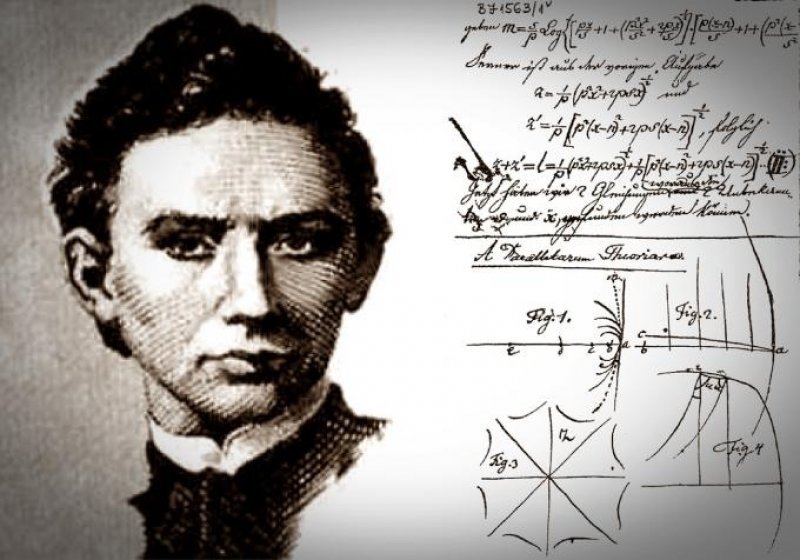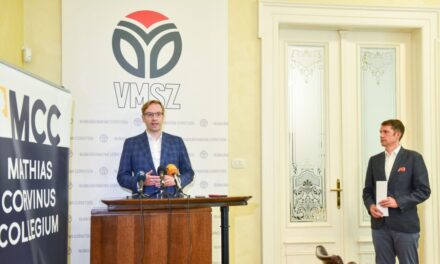Mathematician János Bolyai is the polar star of national unity.
The genius of the Hungarian people
What could be more dignified and striking than recalling the memory of the person who, according to academician János Szentágothai, on the anniversary of the shameful, thank God, failed referendum of December 5, 2004:
"The genius of the Hungarian people in the field of science was embodied at the highest level in János Bolyai".
After the dismemberment of our nation at Trianon, this referendum aimed at severing the spiritual and spiritual unity of our Hungarians was a face-lifter, but it did not leave deep historical wounds.
I do not want to deal with the stain of shame in this commemorative article, but with the celebration and awareness of the positive and most powerful achievement, unparalleled in the history of science. With the historic, never-ending refrain that this year exactly 200 years ago, on November 3, 1823, the former student of the Marosvásárhely reformed college revealed to his father at the age of 21: he made a discovery of scientific historical importance. This is how Transylvania and our other landscape units, the geniuses of the Hungarian people, scientists and writers, poets, teachers and priests, artists and athletes connect souls with a much more powerful force than what anemic disruptors think.
In the mid-2000s, the College of Doctors of the Hungarian Reformed Church met in Debrecen. As chairman of the Literature Section, with my co-chairman, Dr. My brother László Ötvös, a biblical scholar, and I invited Dr. Tibor Toró Hungarian physicist in Romania. An external member of the Hungarian Academy of Sciences, a former student of the Reformed college in Székelyudvarhely, he was already an internationally known and recognized scientist who researched the quantum dynamical properties of neutrinos and delivered an impressive, spiritual history-dizzying lecture. His subject could have been nothing but János Bolyai. The polar star of our national unity, Bolyai's oeuvre and scientific achievements, were presented to the literary audience by Academician Toró in the context of faith and the universal history of physics.
Briefly about the life of the genius from Székely
Now, on the 200th anniversary of János Bolyai's (1802-1860) debut in the history of science, the Debrecen University of Religious Sciences regular professor of theology, the mathematician-theology graduate dr. I am turning the page to a great article by Gaál Botond, PhD of the Hungarian Academy of Sciences, our Széchenyi Prize-winning scientist.
The article was published in several domestic and international scientific journals under the title "I created a new, different world from nothing". The most important things to know about the life path of our self-aware genius, who originally defined himself in the field of his science: He was born on December 15, 1802, in a noble Székely family in Cluj-Napoca.
His mother was Zsuzsanna Árkosi Benkő, and his father was Bolyai Farkas, who was elected professor of mathematics, physics and chemistry at the Marosvásárhely Reformed College in 1804. Their son János's musical and mathematical talent showed itself at an early age. He progressed quickly with his studies at the College. At the age of 16, he was able to enroll at the Imperial and Royal Academy of Military Engineering in Vienna. He completed it at the age of 20.
He was assigned to a military fortress in Timișoara. He played the violin at a serious level and fought well. Already during his academic years, he dealt with the question of the 11th axiom. His interest in parallels comes from his father, although he warned his son against dealing with the subject. He was already serving as a military officer in Timișoara when he solved the question of the axiom of parallelism, and in a letter dated November 3, 1823, he wrote to his father the already quoted self-conscious lines:
"I created a new, different world from nothing."
Thanks to his broad knowledge and ability to speak eight languages, he also knew one of the basic teachings of Christianity, which is summed up by the phrase creatio ex nihilo, i.e. creation from nothing. He formulated his discoveries in Latin in 1825. His father also wrote a two-volume mathematical work, which served as a textbook in Marosvásárhely. János Bolyai's work on non-Euclidean geometry was published attached to the first volume. Before that, it was also published in a special edition and was sent to Gauss, the world-famous mathematician, in 1831. It was originally titled Scientia Spatii. That is: The science of space.
János Bolyai's life was full of bumps. He had been plagued by illness since he was 30 years old, and he hardly had any quiet time to create. Among Hungarian mathematicians, there was no worthy intellectual partner who would have recognized the importance of his work in time. While he was alive, the time was not ripe for this in Europe either. It was only long after his death that the value of his ideas began to be discovered. Orbán had two children from his marriage to Rozália, Dénes and Amália. Their unequal marriage later broke up. He died in 1860, abandoned, in Marosvásárhely. His funeral was attended by three people and a military honor guard. The pastor made the following entry in the death register of the Reformed Church:
"He was a famous mathematician, first among the first. It's a shame that his talent was buried unused."
He lived in the intellectual solitude typical of Hungarian geniuses, without respect.
It is painful to even describe how the fate of the Hungarian tree was projected in his life. The lines written by his late compatriot, the Csúcsán reformed presbyterian poet, Endre Ady, also characterize him: "In my soul/The leaves of the Hungarian tree are falling, they are falling:/Leafily, flowerily,/This is how I must perish". Jenő Dsida also wrote a poem about the other Transylvanian Sándor Makkai, who became a bishop, and who wrote a novel about the fate of the Hungarian tree. In the poem, he spoke about the judgmental forest, which struck a tree with lightning, "the reckless, gangrenous, distorted black stump/rejected! He denied it!". Even Albert Wass, who had migrated far from Transylvania, could not remove his pen from the painful memory of how the trees after the hurricane fall to the road with broken spines: "Poor, wind-beaten, orphaned tree:/this is the fate of the Hungarian tree!". But the Reverend Bolyai Cemetery was the first to describe the real Transylvanian and Hungarian truth in so many cases. Today, we could not better summarize the lessons of Bolyai's life and his message to our Hungarian nation than the two sentences quoted above!
Bolyai even criticized Kant
The everyday view suggested that the world around us is Euclidean. That is, it can be described using Euclidean geometry, i.e. using points, lines and planes. Kant also taught this. Bolyai, on the other hand, sharply criticized Kant's ideas about space:
"Kant, who otherwise has a lot of merit and a beautiful mind, taught to assert the baseless and inappropriately twisted, senseless doctrine: that space ... is not an independent thing, but only shaped by a view or our views!".
Today, we see the reality of space differently. After all, in connection with the general theory of relativity, we can claim that space is the reality that exhibits one or another properties. So it is not only in our imagination, as in the case of Immanuel Kant, but a real element of nature. Bolyai actually showed with his brave step that non-Euclidean geometry is also logically possible. When Professor George Bruce Halsted translated Bolyai's new field theory into English in 1891, he wrote in the preface: "These twenty-four pages are the most extraordinary two dozen pages in the history of thought."
We thank Academician Professor Gaál for his essay on the history of science. And the reminder: Bolyai started the process by opening up the closed axiomatic world, which led to Einstein, who left a huge result for posterity by assuming a constant speed of light. In this sense, the Calvinist Székely Bolyai was really right: "I created a new, different world from nothing"! This is especially true on December 5! Thanks to the god-given "genius of the Hungarian people". And thanks for the reminders!













